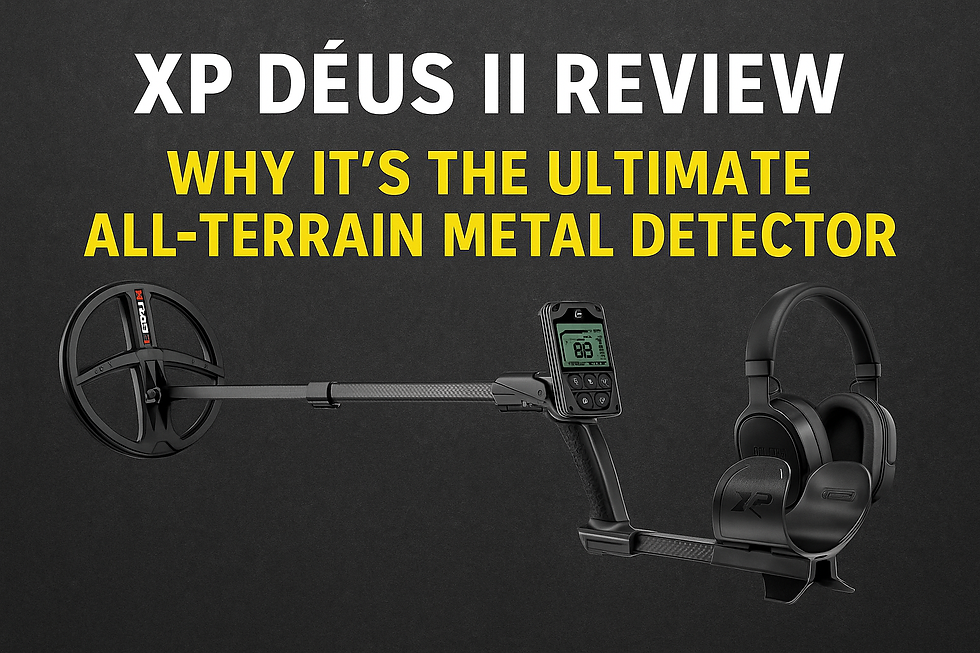Metal Detecting on UK Beaches: Best Spots and Top Tips
- DiggingHistory.co.uk
- Oct 2
- 7 min read
Metal detecting on beaches is one of the most exciting and rewarding parts of the hobby. The sea is constantly shifting the sands, exposing new ground and uncovering long-lost coins, jewellery, and even relics that haven’t seen daylight in centuries. In the UK, our long coastline, rich history, and bustling seaside resorts make beach detecting a unique adventure.
But detecting on beaches also requires careful knowledge of the law, respect for other beach users, and an understanding of the tide. Get it wrong, and you could end up trespassing or even breaking the Treasure Act. Get it right, and you’ll not only enjoy a fantastic day out but also stand a chance of making a discovery that links directly to Britain’s past.
This comprehensive guide covers everything you need to know about beach metal detecting in the UK: from laws and permissions, to the best beaches for detecting, to tide timing, equipment, and practical tips.

Why UK Beaches Are Perfect for Metal Detecting
Britain has one of the longest and most varied coastlines in Europe. From the rugged cliffs of Cornwall to the long sandy stretches of Norfolk, from Blackpool’s tourist beaches to the quiet coves of Wales, every shore has a story to tell.
Historical reasons: Britain has always been a seafaring nation. Ships have traded, invaded, and wrecked along our coasts for thousands of years. Artefacts often end up in the sand.
Tourist traffic: Millions visit seaside resorts every year. Modern losses, rings, necklaces, coins, and phones are common on busy beaches.
Natural movement: Tides, storms, and coastal erosion constantly move sand, uncovering items that might have been buried for decades or centuries.
Accessibility: Beaches are often easier to access than farmland or woodland, making them a natural starting point for beginner detectorists.
With all that said, detecting on UK beaches is not as simple as turning up and sweeping. There are laws, ownership issues, and protected zones you must know about first.
The Legal Side: Permissions, Laws and Reporting
Who Owns the Beaches?
One of the biggest misconceptions is that beaches are “free for all.” In reality, beach ownership is complex.
Foreshore (between high and low tide): In most parts of England, Wales, and Northern Ireland, the foreshore is owned by the Crown Estate. The Crown Estate generally allows metal detecting here under a permissive right, as long as you follow their conditions (hand tools only, no mechanical diggers, no damage).
Above the high tide line (dry beach): This is often owned by councils, private individuals, or organisations like the National Trust. For this land you usually need specific permission.
Scotland: Different rules apply – the Crown Estate Scotland manages much of the foreshore, but all finds (even non-treasure) must be reported under the Treasure Trove system.
Crown Estate Rules
The Crown Estate allows detecting on its foreshore without a formal permit, provided you:
Only use hand tools (no mechanical digging)
Detect responsibly (fill holes, no damage)
Respect third-party rights (some stretches may be leased to councils or others who set their own rules)
This permission does not extend above the high tide line, nor to the seabed.
Local Councils and Byelaws
Many councils issue their own rules for beaches they control:
Cornwall Council: Permits detecting between high and low tide on many beaches without a permit. Above the high tide line, landowner permission is required.
Great Yarmouth Borough Council: Allows detecting on Great Yarmouth and Gorleston beaches without needing a permit. Other beaches may require parish council permission.
Arun District Council (West Sussex): Allows detecting on its beaches freely, though land above the foreshore may require a free permit (available to NCMD or FID members).
Isle of Wight Council: Publishes maps showing which of their beaches allow detecting.
East Lindsey District Council (Lincolnshire): Permits detecting on beaches with certain guidelines.
Always check the local council’s website before heading out.
Areas Off-Limits
Some areas are strictly prohibited:
Scheduled Monuments: Detecting here without written consent is a criminal offence.
SSSIs (Sites of Special Scientific Interest): Many coastal stretches are SSSIs for wildlife or geology. Detecting here is usually forbidden.
National Trust land: The Trust generally bans detecting on its beaches unless part of an official archaeological project.
MoD land: Ministry of Defence beaches are usually restricted.
The Treasure Act 1996
In England, Wales, and Northern Ireland, the Treasure Act sets out what must be reported:
Gold or silver objects at least 300 years old
Coin hoards (two or more gold/silver coins, or ten or more base metal coins, 300+ years old)
Any object found with treasure (e.g. a container)
Items of outstanding cultural importance under updated rules (since 2023)
You must report potential treasure to the local coroner within 14 days. Non-treasure finds should be reported voluntarily to the Portable Antiquities Scheme (PAS).
In Scotland, all finds must be reported under Treasure Trove law.
Best Beaches for Detecting in the UK
Cornwall
Cornwall is one of the richest counties for beach detecting. Its long coastline has seen centuries of shipwrecks, fishing, and trade.
Porthmeor Beach, St Ives: Popular with tourists – expect modern jewellery and coins.
Widemouth Bay: Good mix of tourist losses and chance of older finds.
Portreath & Porthtowan: Known for surf culture, also sites of historical coastal trade.
Praa Sands: Long sandy stretch, good signals after storms.
Cornwall Council permits detecting on many beaches between high and low tide. Always check individual beach status.
Norfolk and Suffolk
The East Anglian coast has long been a hub of maritime trade. Norfolk in particular is detectorist-friendly.
Great Yarmouth & Gorleston: Officially permitted by the council.
Cromer: Tourist town with long sandy beaches.
Sheringham: Known for WWII history and fishing.
Blackpool and Lancashire
Blackpool has been Britain’s most famous seaside town for over a century. Millions have holidayed here, meaning millions of dropped items.
Central Beach: Busy, expect modern losses.
South Shore: Quieter, sometimes reveals older artefacts after storms.
Blackpool beaches are generally open for detecting, though avoid protected dunes.
Other Notable Beaches
Isle of Wight: Several beaches officially mapped for detecting.
Lincolnshire Coast: Long sandy stretches, officially permitted in East Lindsey.
Sussex Coast (Arun District): Mostly allowed, with free permits for some areas.
Welsh Beaches: Check council websites, some allow detecting on Crown Estate foreshore.
Scottish Beaches: Detecting is popular, but all finds must be reported to Treasure Trove.
Tide Timing: When to Detect

Timing is everything on the beach.
Low Tide: Best time. Exposes the foreshore where most finds are.
Spring Tides: Twice a month, these tides are especially low, exposing more sand.
After Storms: Strong winds strip sand and uncover older layers.
One Hour Before and After Low Tide: The golden window for detecting.
Use local tide tables (online or via apps) before heading out. Always be aware of incoming tides – safety comes first.
Equipment for Beach Detecting
Beach detecting needs slightly different kit compared to inland detecting.
Detector: Choose one with good saltwater balance (multi-frequency detectors perform best).
Coil: Waterproof coil is essential. Large coils cover ground faster, but small coils work better in trashy areas.
Pinpointer: Waterproof pinpointer makes target recovery easier.
Sand Scoop: Special long-handled scoops are perfect for sandy beaches.
Finds Pouch: Keeps coins and jewellery separate from junk.
Clothing: Waterproof boots, gloves, and windproof jackets are vital in the UK climate.
Techniques and Strategy
Work methodically: Sweep in lines, overlapping each swing.
Start at busy zones: Near piers, promenades, and steps where people congregate.
Focus on the high tide line: Many items are dropped here.
Revisit beaches after bank holidays and hot weekends – more crowds mean more losses.
Dig everything at first: Learn the tones of your machine before using heavy discrimination.
Ethics and Best Practice
Fill your holes: Always leave the beach as you found it.
Respect others: Don’t swing your coil near sunbathers or dogs.
Report treasure: Follow the Treasure Act.
Record with PAS: Even modern finds can add to local history.
Be discreet: Not everyone understands detecting – a polite smile goes a long way.
Famous Beach Finds in the UK
Shipwreck coins: Occasionally wash up after storms in Cornwall.
Gold rings: Regularly recovered in tourist towns like Blackpool and Bournemouth.
Roman coins: Have been reported from eroding cliffs and beaches in East Anglia.
WWII relics: Buttons, badges, and even munitions can still be found on some coasts – take care and report dangerous items.
Seasonal Detecting Tips
Summer: Best for modern drops, though crowded beaches make discreet detecting harder.
Autumn/Winter: Storms shift sand, uncovering older finds.
Spring: Spring tides expose extra ground.
Rainy Days: Wet sand gives better conductivity, making signals clearer.
10. Safety on the Beach
Tides: Never risk being cut off – always check charts.
Cliffs: Beware of erosion and falling rocks.
Sharp objects: Glass, hooks, and metal can cause injury. Wear gloves.
Munitions: If you find unexploded ordnance, do not touch it – call the police immediately.
Conclusion
Beach metal detecting in the UK is a fantastic way to enjoy the outdoors, find treasure, and connect with history. From the golden sands of Cornwall to the bustling shores of Blackpool, every beach has potential. By respecting the law, using the right equipment, and timing your hunts with the tide, you’ll give yourself the best chance of success.
And remember: every find tells a story – whether it’s a Roman coin revealed by a storm, or a modern wedding ring returned to a grateful owner. The beach is alive with history. All you need to do is uncover it.
🙏 Thank you for reading!I hope you’ve found this guide to metal detecting on UK beaches useful and inspiring. If you enjoyed it, please share it with friends, fellow detectorists, or anyone curious about the hobby. Every share helps support DiggingHistory.co.uk and keeps the community growing.
Happy hunting, and good luck on the sands! 🏖️⚒️





Comments